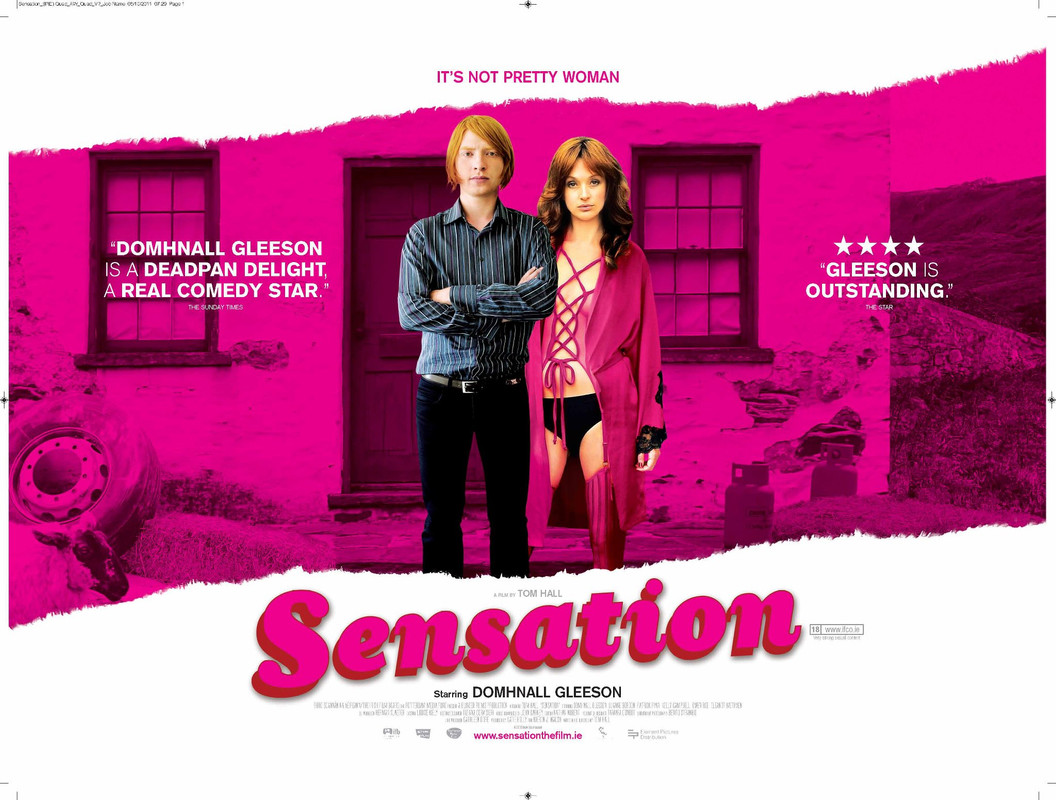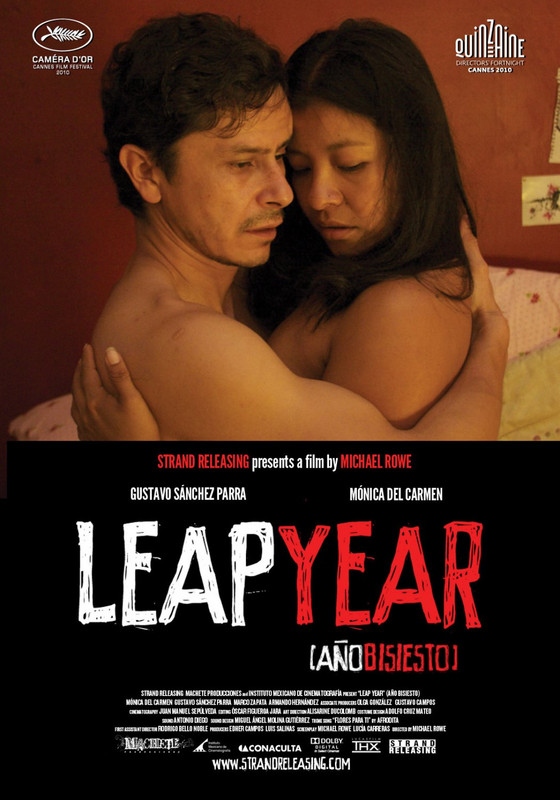Sensation
Dir: Tom Hall
A low budget, small scale, rather black sex comedy from Ireland. Sensation isn’t bad, or even unoriginal, but though I didn’t dislike the film I never truly engaged with it, largely because I didn’t especially care about any of the characters.
At the film’s centre is Donal (Domhnall Gleeson); a lonely man in his mid to late twenties living alone on a sheep farm in the Irish countryside after the death of his father. From that death Donal inherits both money and the land. Things get interesting when he uses some of the money to hire an escort. Kim (Luanne Gordon) and Donal soon move beyond an escort/client relationship when she hears of his inheritance and they set up a new escort agency together.
You have to give writer/director Tom Hall credit, because Sensation doesn’t deal in the expected. There are obvious beats to this story; Donal as the pure sap, being taken by this alluring woman, Kim changing Donal’s look, but his remaining the bumbling farm boy and so on. Happily, Hall doesn’t indulge in these predictable moments. The writing of Donal’s character is especially sharp, as Hall moves him credibly from near mute (or on occasion over talkative; his first attempt to pick up local beauty Melanie (Kelly Campbell) is skin crawlingly uncomfortable and very funny) farm boy to snappily styled, smoother talking, small time pimp. The relationship between Donal and Kim is nicely drawn too, and Hall never quite shows his hand in regards to how genuine it is, whether there is feeling there or Donal is just being – pardon the pun – taken for a ride.
The leading performances are strong, with Domhnall Gleeson (son of Brendan) making an especially strong impression as Donal. He makes the character’s transformation credible, while always retaining the impression that, underneath, he’s the same insecure farm boy he always was. Luanne Gordon does a nice job of keeping Kim’s motivations just a little mysterious, and she’s good when Kim is in character as escort “Courtney”.
The problem is that, for me, all these good parts didn’t add up to a great deal. The bottom line was that I didn’t really care how genuine Kim and Donal’s relationship was, because I never really liked or sympathised with either of them, and since that is the central thread of the film it left the whole feeling a little flat for me. That said, there’s enough here that is good to suggest that the cast and director will do better work in the future.
★★☆☆☆½
Leap Year
Dir: Michael Rowe
Leap Year focuses on a month (a 29 day February) in the life of Laura (Monica Del Carmen), a journalist living in Mexico. The film takes place almost entirely in her small apartment, where during this month, she conducts an S and M fuelled affair with older man Arturo (Gustavo Sanchez Parra). It begins with a few slaps, and over the course of the relationship escalates to real violence and humiliation. Laura crosses off the days on her calendar, leading up to the 29th, which is coloured in red.
I first heard of Australian director Michael Rowe’s film when it played at Cannes, and won the prestigious Camera D’or prize, and since seeing it at the press screening I’ve heard many other critics speak of it in slightly awed tones. I don’t get it. Leap Year is explicit and disturbing, but to what purpose? I never felt that I knew anything much about either of its characters (there is an implied sexual trauma in Laura’s past, but it is referred to only once, tangentially, and may be made up anyway, since other scenes paint her as a liar) nor that their many totally unerotic sex scenes told me anything meaningful about them, except to set up the film’s rather obvious ending.
The technical elements of the film are largely strong. Rowe finds a great variety of shots in Laura’s apartment, and his repeated technique of shooting each sex scene in a single static take is interesting, as it establishes a visual identity for the film and forces you to dwell in each increasingly nasty scene.
The performances, given the limitations placed on them by the script, which refuses to put much meat on the bones of these characters (especially Arturo), are excellent. Del Carmen gives a brave and exposing performance which hints at deep-seated reasons for her need for this relationship, while Gustavo Sanchez Parra does what he can with a character so thin he’s barely there, drawing a strong distinction between Arturo’s violent and tender sides. There is one especially strong scene towards the end of the film, in which Laura asks Arturo to take their relationship to an even more extreme level. Del Carmen is outstanding in this scene, really bringing across the depth of Laura’s sadness.
Despite the surprisingly strong acting, I found Leap Year boring. After fifteen minutes or so it settles into a rhythm; dry conversation / S and M / dry conversation / S and M. Even as the sex scenes become more extreme their frequency renders them dull, which is a real problem when the film is trying to be shocking. I was also bored because I barely knew who these people were, they are so sketchily defined that there’s little to invest in and even as Laura’s motivation became clear, dramatic as it was, I just didn’t much care, because the film never made her real and rounded enough.
★★☆☆☆
The American
Dir: Anton Corbijn
The American is directed by photographer and music video director Anton Corbijn (making his second film following the slightly overpraised Control), so of course it looks stunning. Everything is beautiful; the Italian countryside, the light, the framing, the women and yet this film is almost painful to sit through, a punishingly boring, predictable, event and investment free 90 minutes of very pretty tedium.
Based on a novel by Martin Booth, the film tells the story of a professional killer (George Clooney), who gives his name as Jack to some people, Edward to others. There is an attempt on his life in Switzerland, but he escapes and agrees to do one last job for his handler; making a special gun for a female assassin (Thekla Reuten). While hiding out in a small rural village in Italy ‘Edward’ falls for a prostitute (Violante Placido), but can he trust her… or anyone
I try not to give spoilers, but I’d be surprised if, from that brief summary, you don’t know who the surprise villain of the piece is. If not, don’t worry, you will, about 75 minutes before ‘Edward’. That’s the problem here, every little beat of this film is predictable, every plot point, every character interaction, every twist is so hackneyed that nothing is a surprise. Long before it played out I had predicted, in some detail, the final set piece.
Characterisation is thin to the point of non-existence. Placido, who isn’t bad, is simply asked to play one more variation on the practically antique character of the hooker with a heart of gold, Paolo Bonacelli’s priest speaks almost entirely in significance laden clichés and Thekla Reuten is a complete cipher. Sadly this is also true of Clooney. ‘Jack’ or ‘Edward’ or ‘Mr Butterfly’ has more names than character traits and, unable to find anything to play, Clooney coasts on his charisma. The effect is not to wrap us up in the story of an assassin doing his last job, but rather to give the impression of looking at George and Anton’s holiday video, because there is never any sense that you’re watching anyone but George Clooney.
Investment in a film’s characters is hugely important, if you don’t have that everything else falls away. Had it been there I might have had some interest in Clooney’s fate, and some level of interest in what happened between Jack and the hooker. As it is the film tries to give this relationship weight, but fails miserably because neither the characters nor the story are interesting. For all its interesting qualities The American may just as well be a film for the Italian tourist board.
★★☆☆☆




No comments:
Post a Comment